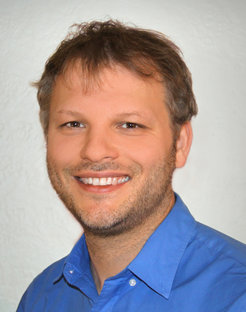"Our memory is not made for the past, but for the future"
Forgetfulness is by no means a sign of weakness, but an elaborate, active process. In his new research group Adaptive Memory, which has been running since the beginning of May, Roland Benoit has been researching how memories can be suppressed on the one hand, and on the other, how those can serve us in the future.
We are constantly making an effort to not forget things—whether it is our mother’s birthday, a doctor’s appointment, or important facts out of politics and society. We are concerned about becoming more forgetful in old age. Forgetting has a bad reputation.
Forgetfulness is not merely a sign of decreasing brain performance. Instead, it is often an active process that requires effort, especially when the memories are overpowering and traumatic.
But how do we intentionally forget something? Roland Benoit examines this question in his newly established research group Adaptive Memory at the Max Planck Institute for Human Cognitive and Brain Sciences in Leipzig. Not only is he interested in how memories can be suppressed but also in how we can use past memories to imagine our future. A conversation about forgetfulness and recollection, past and future.

Mr. Benoit, in our daily lives we use personal organisers and electronic reminders to avoid forgetting things, but you want to find out how we can forget intentionally. Why?
Because our brain is a fantastic evolutionary achievement by which we can use negative and positive memories to make informed decisions about the future. Nevertheless, it is not always helpful to remember to every negative experience. This becomes especially apparent in people who suffer from spontaneous unwanted memories of traumatic experiences. Generally, we would prefer to ignore memories from certain experiences that we are exposed to in our daily lives.
Could you give us an example?
Imagine you had a dispute with your partner. The next time you meet them you might well remember that, although you would much prefer to forget about it and move on. In situations such as this, where you are eager to forget a former experience, it seems possible to suppress the emerging memory and finally forget about it altogether. How this works exactly, I would like to find out. In principle, there seem to be two mechanisms to suppress memories from our minds.
Can you describe them?
Imagine you are sitting in a car that is automatically driving at high speed to the unwanted memory. You could avoid the collision in two different ways. One way is by jamming on the mental brakes and thus trying to stop the memory process just in time—that is, direct memory suppression. Two brain structures are important for this, one of which is the hippocampus which would drive us like an engine to the unwanted memory if the second structure was not present— the prefrontal cortex, at the forefront of our brain. One part of the right prefrontal cortex seems to work as a brake that switches off the hippocampus—and therefore the memory—to a certain extent.

And the second type of intentional forgetting, how does that work?
Instead of forcefully applying the mental brakes, you could also try to avoid the unwanted memory by redirecting to another one. For instance, when you meet your partner again you could think about the nice dinner with them at the Italian restaurant instead of the conflict. The alternative memory blocks access to the unwanted one. Here, you do not stop every memory but influence the memorisation process. By employing this alternative memorisation technique, the hippocampus is not stopped but systematically utilised. Therefore; parts of the left prefrontal cortex are used as a steering wheel to guide the process onto the right track.
These two mechanisms of intentional forgetting; direct suppression and recalling an alternative memory, could help us to keep continual control over our memories. For those suffering from post-traumatic stress disorder, these mechanisms seem to be impaired.
When is each mechanism activated?
This is still unknown. I think in the case of particularly strong memories it could be easier to replace them with alternative ones. My research group is keen to examine whether this is also the most effective method of controlling such memories for the long-term.
What happens to our memories after that? Are they really erased, or do they just go to the back of our minds, the unconscious? Can we really become oblivious to previously anchored memories?
Both seem to be possible. If you always think about being in the nice restaurant with your partner instead of arguing with them, the pleasant thought could become stronger. In this case, it blocks access to the unwanted memory. We with the help of other scientists, we could show that both mechanisms lead to real eradication of unwanted memories. You would not remember any details of the dispute when questioned. It seems as though these unwanted memories could not even influence our behaviour unconsciously after that.
Do these mechanisms take place automatically or do we have to consciously decide to forget?
No, presumably not. Although my research focuses on intentional forgetting, I presume that we also use these processes in our daily lives. When we want to get rid of the memory of an embarrassing situation, for instance, a suppression mechanism probably turns on unconsciously.
Does intentional forgetting only work for negative memories?
No, We frequently save similar information in our minds. If you want to remember your new phone number, it could be that you can only remember the old one. In these situations it appears that we use a similar mechanism to weaken the stronger memory of the old number in a targeted manner, thereby helping us to retrieve the new one.
In your new research group you do not only examine how we suppress or rewrite memories but also how they serve to function in the future. Could you explain that in a little more detail, please?
Basically, our brains are not only made for the past, but more for the future. Unlike a video where we can watch a continuous chain of events, we only remember parts of our experiences and unconsciously fill the gaps with our general knowledge. You see, remembering is a constructive process. Our ability to imagine the future relies on this kind of constructive thinking. How would it be to go with a certain person to a certain restaurant? To imagine this situation, we combine memories of the restaurant with those of the person in order to visualise a new experience and to decide whether we really want to go to this restaurant with this person.
What are you eager to find out regarding the issue of constructive mind, exactly?
I am interested in how the brain is able to envisage the future. So far, we know that certain brain regions are actively involved simultaneously for memory. But still we do not know which region plays which role. I would like to find out what the specific function of the medial prefrontal cortex is, which seems to help us to predict our emotional reactions to a certain experience.
I would also like to find out why it is necessary to imagine the future with the help of memories. Although it can bias decisions towards more farsighted outcomes it is not always beneficial to do so permanently.
What do you mean by that?
However, despite the clear values of adapting our decisions by envisaging the future, dwelling too much on the future may also have adverse consequences. For instance, when we are afraid of certain situations. Imagining them could strengthen these fears and make them seem even more plausible. I am trying to understand whether, in such situations, the mechanisms involved in memory suppression may also be employed to effectively stop imagining a negative outcome.
Do you believe that we should view forgetfulness in a more positive light?
Yes, indeed. However, through my research I’m not suggesting to forget every negative experience. Frequently, we have to integrate the bad moments in life in order to form our characters. However, it is not always good to worry about every unpleasant situation that happened to you or that could happen in the future.
Mr. Benoit, thank you for the interview.
Verena Müller, scientific journalist at the Max Planck Institute for Human Cognitive and Brain Sciences, Leipzig, interviewed Mr. Benoit.













